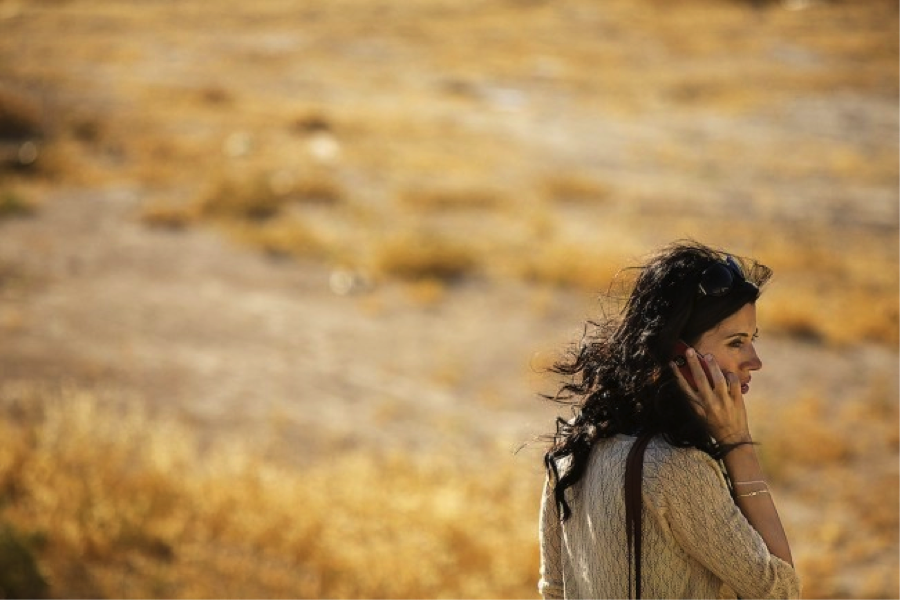

Award-winning writer, director, and producer is known as one of the leading Arab-American filmmakers on the scene today.
Her first film, , won prizes and nominations at festivals all over the world, from to .
{Image }
Dabis’ much-anticipated next film, , is a chronicle of love across geographies set in a city of unlikely exile: Amman, Jordan. And this time, she is the leading lady onscreen as well as off.
We got the chance to speak with Dabis about her new film, her foray into acting, and the many implications presented in her work.
May in the Summer deals closely and carefully with several taboos: Inter-religious marriage, homosexuality, premarital sex, US foreign policy and getting remarried, to name a few. These topics weigh heavily on the hearts and minds of the characters in Dabis’ film. The story centers on May Brennan, a Palestinian-American writer living in New York who has come back to Amman to get married. As she reunites with her two sisters and parents, the carefully structured life May has established for herself begins to unravel.
Family, the universal topic
Although her film is distinctly Palestinian, Dabis says that May in the Summer was made with a broad audience in mind.
“There are scenes in the film that transcend geography. They’re universal. I was at the premiere in France last week and it was amazing to be there and see what the French took away from the movie,” she says.
“A lot of people related to the dynamic between May and her mother and that disapproval [of marrying outside her religion]. Other people felt like the relationship between the sisters is what spoke to them. Relationships are what matters.”
Dabis added that Turkish viewers found many of the themes in her film relatable as well, but in a different way.
“At the Istanbul Film Festival there is a lot of conversation around marriage. It’s very important in Turkish culture. People identify with a film that questions why people get married, what it means to get married, and examines the pressure women feel to get married.”
Palestine: “It’s a longing; it’s a conversation; it’s an obsession and a preoccupation”
Dabis refuses to ignore the turbulence of the region, despite the focus on interpersonal relationships in the film.
“Jordan is a really unique place because of the stability it has enjoyed. It has given people a real perspective on the region,” says Dabis.
In one memorable scene, the sisters are quarreling at a Dead Sea resort when a fighter jet booms past the sunbathers, a reminder that war is not as far as it might seem, and a reality check that makes their interrupted squabble seem petty.
Palestine is the unspoken backdrop of the story. “Growing up in the diaspora – that’s very much what Palestine is. It’s a longing; it’s a conversation; it’s an obsession and a preoccupation. It takes on all these different forms and shapes.”
On casting May in the Summer
Part of the film’s appeal comes from the level of comfort the actresses clearly have with each other onscreen. This comes as no surprise, since this is the second time Dabis has worked with both and (who play May’s mother and sister respectively).
“When I came up with the idea for May in the Summer [Abbas and Shawkat] immediately came to mind. It was really fun to write the script with specific actors in mind. Alia has so much of that character already – a sharp wit; a sense of humor. It was nice to have a dialogue with the actors years before the project.”
May in the Summer is the first time Dabis appears in her own film. When Amreeka was on the festival circuit, Dabis had several directors trying to cast her for their next films, but at the time she was reluctant to give her acting chops a try.
“People have been encouraging me to put myself in front of the camera, but I thought they were crazy. I was scared of making myself vulnerable, but I knew it was an opportunity to go deeper into my art, my work and my storytelling. I had to stop saying no and put myself out there. It was the next step for me as a storyteller.”
After a year of looking for the perfect actress for May, Dabis put herself through a rigorous audition, taping herself and screening it for other people involved in the project. She got the part.
For May, “reverse migration” is at the heart of her challenge
Whereas Amreeka is a story of immigration, May in the Summer is what Dabis calls a “reverse migration.”
“The films go together. They complement each other. One is about exploring the part of me that is considered Arab in America, and one is about exploring the part of me that is considered American in the Arab world. They complete each other but are quite different.”
While Amreeka ends on an optimistic note, May in the Summer is more introspective.
“There is an individualistic aspect and a familial aspect to May. I hope the film says to people ‘we can love each other despite our differences.’ We all come from such different perspectives, but we can still love each other and get each other through the difficult times,” she says.
“While Amreeka has a similar message, May is more about the war within the family. From the imperialist American father to the wounded Palestinian mother, they all represent the differences inherent within society. The movie is also really internal so in a way it’s the kind of thing that’s urging people to listen to their own inner voices and trust themselves. In a world that’s full of distraction, we have to learn to trust ourselves.”
Both films pull from Dabis’ experience. Recently, her mother moved back to Jordan, and she grew up with four sisters. But overall, Dabis feels that Amreeka is her true autobiographical work.
“May in the Summer is pure fiction,” she says. Although Dabis plays May, the eldest and most responsible of the three sisters, she says that she sees parts of herself in all of the siblings.
Dabis herself is a testament to how in belonging to two worlds we can end up belonging to many. Yet, in her work, May finds amongst the complications of migration that she belongs only to herself.
May in the Summer is set to release in the United States August 22nd. Catch the trailer .
By Munir Atalla


